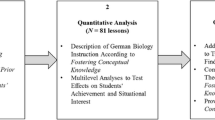Abstract
This study investigated the effects of using the cooperative concept mapping (CCM) teaching approach on secondary school students’ motivation in biology. A non equivalent control group design under the quasi-experimental research was used in which a random sample of four co-educational secondary schools was used. The four schools were randomly assigned to four groups. Each school provided one Form Two class. The study sample comprised of 156 second grade students in the secondary school cycle (Form Two students) in Gucha District, Kenya. Students in all the groups were taught the same biology content but two groups, the experimental groups, were taught using the CCM approach while the other two, the control groups, were taught using regular teaching methods. Two groups, one experimental and one control, were pre-tested prior to the implementation of the CCM intervention. After four weeks, all four groups were post-tested using the students motivation questionnaire (SMQ). Data were analysed using the t-test, ANOVA and ANCOVA. The results show that students exposed to the CCM approach have significantly higher motivation than those taught through regular methods. The results further indicate that there is no statistically significant gender difference in motivation towards the learning of biology among secondary school students exposed to CCM. The researchers conclude that CCM is an effective teaching approach, which biology teachers need to incorporate in their teaching.
Similar content being viewed by others
References
Alexpoulou, E. & Driver, R. (1996). Small-group discussion in physics: Peer interaction modes in pairs and fours. Journal of Research in Science Teaching, 33, 1099–1114.
Ames, R. & Ames, C. (1984). Research on motivation in education. Orlando, F.L.: Academic.
Bianchini, J.A. (1997). Where knowledge construction, equity, and context intersect: Student learning of science in small groups. Journal of Research in Science Teaching, 34, 1039–1065.
Cook, T.D. & Campbell, D.T. (1979). Quasi-experimentation: Design and analysis issues for field settings. New York, NY: Rand McNally.
Cooper, J. & Robinson, P. (2002) Small-group instruction in Science, Mathematics Engineering and Technology disciplines. Dominguez Hills: California State University.
D’Amico, M. & Schmid, R.J.F. (1997). Psychology applied to teaching, 8th edn. New York: Houghton Mifflin.
Fraenkel, J.R. & Wallen, N.E. (1990). How to design and evaluate research in Education. New York: McGraw-Hill.
Gall, M.D, Borg, W.R. & Gall, J.P. (1996). Educational research, an introduction, 6th edn. New York: Longman.
Gautam, P. & Huiqin, H. (2005). Motivation or cognition? What leads to performance differences in science? http://www.education.ualberta.ca. Retrieved November 2005.
Hamachek, D. (1995). Psychology in teaching, learning and growth. Boston: Allyn and Bacon.
Hanrahan, M. (1998). The effect of learning environment factors on students’ motivation and learning. International Journal of Science Education, 20(6), 737–753.
Heinze-fry, J. & Novaka J.D. (1990). Concept mapping brings long-term movement towards meaningful learning. Science Educator, 74(4), 461–472.
Johnson D.W. & Johnson R.T. (1992). Positive interdependence. Key to effective Cooperation. In R. Hertz-Lazarowitx & N. Miller (Eds.), Interaction in cooperative groups (pp. 174–199). Cambridge: Cambridge University Press.
Johnson, D.W. & Johnson, R.T. (1994). Learning together alone. Cooperative competitive and individualistic learning, 4th edn. Needham Hts, MA: Allyn and Bacon.
Kelly, G.J. & Green, J. (1998). The social nature of knowing: Towards a socialcultural perspective on conceptual change and knowledge construction. In B. Guzzetti & C. Hynd (Eds.), Perspective on conceptual change: Multiple ways to understand knowing and learning in a complex world (pp. 145–181). Mahwah, NJ: Lawrence Earlbaum.
Kiboss, J.K. (1997). Relative effects of computer based instruction in physics on students’ attitudes, motivation and understanding about measurement and perceptions of classroom environment. PhD Thesis, University of the Western Cape.
Kinchin, I.M. (2000). Concept mapping in biology. Journal of Biological Education, 34(2), 61–69.
KNEC (1999). Kenya certificate of secondary education examination report. Nairobi, Kenya: Kenya National Examinations Council.
KNEC (2003). Kenya certificate of secondary education examination report. Nairobi: Kenya National Examinations Council.
Mills, H.R. (1991). Teaching and training. A handbook for instructors, 3rd edn. London: Macmillan.
Nelson, R.M. (2000). Motivation to learn science: Differences related to gender. Journal of Educational Research, 93(4), 245–255.
Slavin, R.E. (1992). When and why does cooperative learning increase achievement? Theoretical and empirical perspectives. In R. Hertz-Lazarowitz & N. Miller (Eds.), Interaction in cooperative groups: The theoretical anatomy of groups learning (pp. 145–173). Cambridge: Cambridge University Press.
Thorndike, R.L. & Thorndike R.M. (1994). Reliability in education and psychological Measurement. In T. Husen & T.N. Postleth-Waite (Eds.), The international encyclopaedia of education, vol. ix, 2nd edn. (pp. 4991–4992). Boulevard: Pergamon.
UNESCO (1986). A Handbook for biology teachers in Africa. Paris: UNESCO.
Wachanga, S.W. (2002). Effects of cooperative class experiment teaching method on secondary school students’ motivation and achievement in Chemistry. Unpublished Ph.D Thesis, Egerton University, Njoro.
Wiersma, W. & Jurs, S.G. (2005). Research methods in education. An introduction, 8th edn. Boston: Pearson.
Author information
Authors and Affiliations
Corresponding author
Rights and permissions
About this article
Cite this article
Keraro, F.N., Wachanga, S.W. & Orora, W. Effects of Cooperative Concept Mapping Teaching Approach on Secondary School Students’ Motivation in Biology in Gucha District, Kenya. Int J Sci Math Educ 5, 111–124 (2007). https://doi.org/10.1007/s10763-005-9026-3
Received:
Accepted:
Published:
Issue Date:
DOI: https://doi.org/10.1007/s10763-005-9026-3




